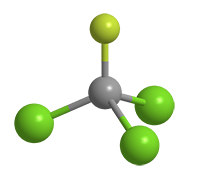What molecule am I?


Trichlorofluoromethane, also known as CFC-11 and Freon 11, is a refrigerant, aerosol propellant, and foam-blowing agent. It is unusual in that its boiling point is at normal ambient temperature and pressure, so it can be handled as a liquid or gas. It is often described as having an “ethereal” (i.e., etherlike) odor.
Once the world’s most widely used refrigerant, CFC-11 came under attack in the 1980s because it was discovered that CFC-11 and other chlorofluorocarbons deplete the ozone layer in Earth’s atmosphere. Countries that subscribed to the Montreal Protocol of 1987 agreed to a moratorium on its production, with full cessation by 2010. The United States stopped making it at the end of 1995.
The atmospheric concentration of CFC-11 gradually decreased from 1995 to 2014, when it began to rise again. Recently, atmospheric monitoring by S. Park at Kyungpook National University (Daegu, South Korea) and collaborators in six countries revealed that significant CFC-11 emissions are coming from northeast China despite the country’s efforts to clamp down on manufacturers. According to one team member, “They’re producing [CFC-11] in serious quantities. We hope this [study] provides another piece of information [China] can use to tackle this problem.”
Trichlorofluoromethane hazard information
| GHS classification*: acute toxicity, dermal, category 4 | |
| H312—Harmful in contact with skin | |
*Globally Harmonized System of Classification and Labeling of Chemicals. Explanation of pictograms.
Trichlorofluoromethane fast facts
| CAS Reg. No. | 75-69-4 |
| Empirical formula | CCl3F |
| Molar mass | 137.37 g/mol |
| Appearance | Colorless liquid or gas |
| Boiling point | 23.7 ºC |
| Water solubility | 1.1 g/L |
MOTW update
Sulfoxaflor was the Molecule of the week for October 5, 2015. It is a central nervous system insecticide that is toxic to honeybees. In 2015, a federal appeals court overturned its US Environmental Protection Agency registration. But earlier this month, in a controversial move, EPA reauthorized its use on several crops. Will more legal action follow?

Learn more about this molecule from CAS, the most authoritative and comprehensive source for chemical information.
Molecule of the Week needs your suggestions!
If your favorite molecule is not in our archive, please send us a message. The molecule can be notable for its current or historical importance or for any quirky reason. Thank you!
Stay Ahead of the Chemistry Curve
Learn how ACS can help you stay ahead in the world of chemistry.

